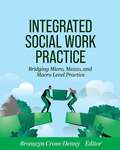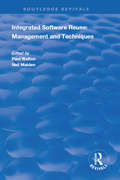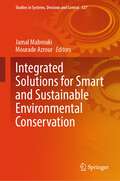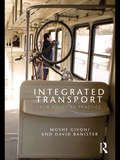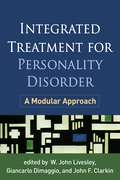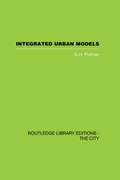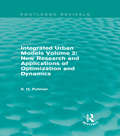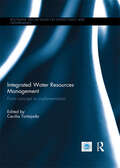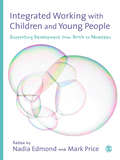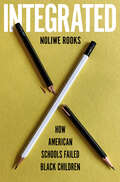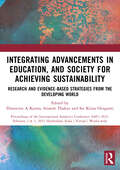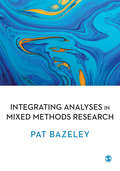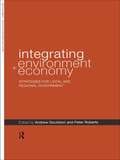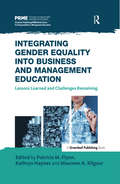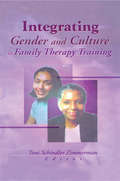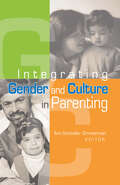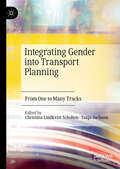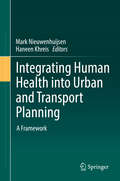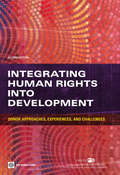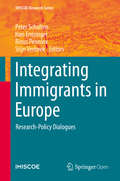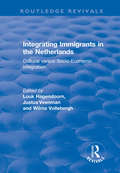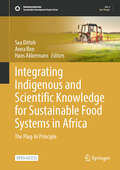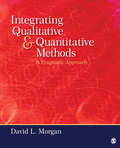- Table View
- List View
Integrated Social Work Practice: Bridging Micro, Mezzo, and Macro Level Practice
by Bronwyn Cross-DennyFeaturing contributed chapters written by a variety of experts in the field, Integrated Social Work Practice: Bridging Micro, Mezzo, and Macro Level Practice presents vital and contemporary concepts within the discipline as an integrated whole, valuing and examining each topic at the micro through macro level. Section I introduces students to integrated practice, providing a brief history of social work and examining client systems at the micro, mezzo, and macro levels. Section II focuses on the signature pedagogy of fieldwork and includes interprofessional collaboration, and self-care and wellbeing. In Section III, students explore the social work process-from engagement through termination-at all practice levels. Section IV focuses on social justice, including diversity, equity, and inclusion; anti-racism and multicultural competency; intersectionality; practice with aging and LGBTQ+ populations; and human rights. Students focus on topics related to global engagement in Section V. The final section encourages evaluation, self-reflection, and lifelong learning. Individual and group exercises, practice integration examples, In the Field features, and student narratives support the overall learning experience. Presenting students with a cutting-edge approach aligned with building key competencies, Integrated Social Work Practice is an invaluable textbook for B.S.W. and M.S.W. programs and courses.
Integrated Software Reuse: Management and Techniques (Routledge Revivals)
by Neil Maiden Paul WaltonPublished in 1993. Software reuse has been shown to achieve improvements in productivity, quality and timeliness of software. The collection of papers in this book were given at a seminar organized by UNICOM and the British Computer Society Software Reuse Specialist Group. They address the reasons why software reuse can maximize an organization's return from past expenditure and ensure a good future expenditure. Increasing the automation of software development requires access to explicit knowledge about processes and products involved. The chapters examine the relationship between reuse and other aspects of software engineering, including management techniques and structures, CASE, methodologies and object orientation. In addition, the papers aim to provide a structures insight into new techniques which will become available through the 1990s. This text is suitable for software managers and directors, software engineers, software professionals, academics, and other involved in software engineering research.
Integrated Solutions for Smart and Sustainable Environmental Conservation (Studies in Systems, Decision and Control #527)
by Mourade Azrour Jamal MabroukiResource depletion and ecological risks are more than ever at the heart of societal and economic debates. In the 1970s, the developed countries saw the Fordist growth regime crumble in parallel with the growing awareness of the ecological issue. Since the first industrial revolutions, technological dynamics have been the cause of many environmental problems, and there is a consensus on the diagnosis. Integrated technologies reduce resource use and/or pollution at source by using cleaner production methods. This generally leads to a reduction in the by-products, energy inputs and resources used by companies to produce goods. Integrated production technologies reduce negative environmental impacts at source by substituting or modifying cleaner technologies. Examples of integrated, or cleaner, production technologies are the recirculation of materials, the use of environmentally friendly materials (such as the substitution of water for organic solvents), etc. However, the implementation of integrated production technologies is often hampered by obstacles related to cost, coordination and skill inertia problems and to the productive organisation of companies. In addition to the high investment costs of new integrated technologies, additional barriers may emerge depending on the nature of the environmental problem and the type of environmental regulation in question.
Integrated Transport: From Policy to Practice
by David Banister Moshe GivoniTravel is an essential part of everyday life and today most journeys are multimodal. It is the total travel experience that counts and integrated transport must reduce the inconvenience of transfers between modes. Most research and many publications on transport policy advocate sustainable transport, but the priority given to integration has been negligible. Yet integration is one of the most important means to advance sustainable transport and sustainability more generally. While integrated transport systems are seen to be an ideal, there is a failure to make the transition from policy to practice. The authors argue that the achievement of sustainable transport is still a dream, as an integrated transport policy is a prerequisite for a sustainable transport system. It is only when the two concepts of sustainability and integration operate in the same direction and in a positive way that real progress can be made. In this book, transportation experts from across the world have addressed the questions about what is integration, why is it so important and why is it so hard to achieve? The book provides an in-depth analysis of these issues and it aims to provide a better understanding of the subject, about what should be strived for, about what is realistic to expect, and about how to move forward towards a more integrated provision of transport infrastructure, services and management.
Integrated Treatment for Personality Disorder
by W. John Livesley John F. Clarkin Giancarlo DimaggioRather than arguing for one best approach for treating personality disorder, this pragmatic book emphasizes the benefits of weaving together multiple well-established intervention strategies to meet each patient's needs. A framework is provided for constructing a comprehensive case formulation, planning treatment, and developing a strong therapeutic alliance. The clinician is guided to utilize techniques from all major therapeutic orientations to address transdiagnostic personality symptoms and problems involving emotion regulation, interpersonal functioning, and self and identity. Showing how to pick and choose from "what works" in a thoughtful, coordinated fashion, the book features rich clinical illustrations, including a chapter-length case example.
Integrated Urban Models Volume 1 (RLE: The City): New Research And Applications Of Optimization And Dynamics
by S. H. PutmanThis book was first published in 1983.
Integrated Urban Models Volume 2: New Research and Applications of Optimization and Dynamics (Routledge Revivals)
by Stephen H. PutmanFollowing on from Integrated Models Volume 1: Policy Analysis of Transportation and Lane Use (Routledge Library Editions, 2006), this book bridges the gap between the scholars and the practitioners of transportation and land-use modelling. First published in 1991, chapters discuss model-calibration and model-solution problems, describe a series of numerical and policy analyses, and propose potential directions for location and land-use research. This reissue will be of particular value to undergraduate and postgraduate geography students with an interest in integrated urban modelling; in particular, the research conducted in the field over the past two decades.
Integrated Water Resources Management: From concept to implementation (Routledge Special Issues on Water Policy and Governance)
by Cecilia TortajadaThe book includes seventeen excellent researched and documented papers that reflect the diversity of thought, ideas and experiences related to IWRM. They draw from an extensive, inclusive and geographically representative range of theoretical propositions and practical examples. These include the implementation status of the IWRM concept at local, basin, regional and national levels; its appropriateness for the twenty-first century; main implementation gaps from the institutional, legal, policy, governance, management and technical viewpoints; the likelihood that IWRM’s entrenchment in laws, regulations and policies has led to smoother implementation and the reasons why that has been the case; reflexions on whether the attention given to IWRM is pushing other alternatives to the policy periphery; and the new conceptual constructions that can be put forward for discussion in the international arena.For the development and water communities it is imperative to debate and reach towards more illustrative conclusions regarding whether the promotion of the IWRM concept and its actual implementation status have been beneficial for development and how the notion could evolve to achieve this end. In-depth objective and constructive discussions, arguments, proposals and ideas are put forward for analysis by all interested parties. The book has the objective of fostering scholarly exchange, encouraging intellectual debate and promoting the advancement of knowledge and understanding of IWRM as a concept, as a goal per se and as a strategy towards development goals.This book was published as a special issue of the International Journal of Water Resources Development.
Integrated Working with Children and Young People: Supporting Development from Birth to Nineteen
by Ms Nadia Edmond Mr Mark PriceThis interdisciplinary core textbook looks at learning and development from birth to 19 years providing, an accessible introduction to the common areas of study across the many roles supporting learning and development in the young people's workforce. There is coverage of common themes and issues, and theory is closely integrated with practice throughout. Chapters cover: - physical development - cognitive development - social and emotional development - professionalism - leadership - quality and effectiveness - working with families - safeguarding and promoting well-being - transitions - equality and inclusion Reflection points, workplace activities and professional development planners are all included and these challenge readers and students to critically engage with theory in their own practice. The book focuses on the key areas of knowledge that all those working with children are required to study, and places them firmly in the context of working together to support children and young people. Nadia Edmond is Assistant Head of School (Teaching and Learning/CPD), at the University of Brighton. Mark Price is Principal Lecturer and Foundation and Honours Degree Programme Leader Working with Children and Young People at the University of Brighton.
Integrated: How American Schools Failed Black Children
by Noliwe RooksA powerful, incisive reckoning with the impacts of school desegregation that traces four generations of the author&’s family to show how the implementation of integration decimated Black school systems and did much of the Black community a disserviceOn May 17, 1954 the landmark case Brown v. Board of Education determined that racial segregation in schools was unconstitutional. Heralded as a massive victory for civil rights, the decision's goal was to give Black children equitable access to educational opportunities and clear a path to a better future. Yet in the years following the ruling, schools in predominantly Black neighborhoods were shuttered or saw their funding dwindle, Black educators were fired en masse, and Black children faced discrimination and violence from their white peers as they joined resource-rich schools that were ill-prepared for the influx of new students.Award-winning interdisciplinary scholar of education and Black history Noliwe Rooks weaves together sociological data and cultural history to challenge the idea that integration was a boon for Black children. She tells the story of her grandparents, who were among the thousands of Black teachers fired following the Brown decision; her father, who was traumatized by his experiences at an almost exclusively-white school; her own experiences moving from a flourishing, racially diverse school to an underserved inner-city one; and finally her son and his Black peers, who over half-century after Brown still struggle with hostility and prejudice from white teachers and students alike. She also shows how present-day discrimination lawsuits directly stem from the mistakes made during integration.At once assiduously researched and deeply engaging, Integrated tells the story of how education has remained both a tool for community progress and a seemingly inscrutable cultural puzzle. Rooks' deft hand turns the story of integration's past and future on it's head, and shows how we may better understand and support generations of students to come.
Integrating Aboriginal Perspectives Into the School Curriculum
by Yatta KanuFrom improved critical thinking to increased self-esteem and school retention, teachers and students have noted many benefits to bringing Aboriginal viewpoints into public school classrooms. In Integrating Aboriginal Perspectives Into the School Curriculum, Yatta Kanu provides the first comprehensive study of how these frameworks can be effectively implemented to maximize Indigenous students' engagement, learning, and academic achievement. Based on six years of empirical research, Kanu offers insights from youths, instructors, and school administrators, highlighting specific elements that make a difference in achieving positive educational outcomes. Drawing on a wide range of disciplines, from cognitive psychology to civics, her findings are widely applicable across both pedagogical subjects and diverse cultural groups. Kanu combines theoretical analysis and practical recommendations to emphasize the need for fresh thinking and creative experimentation in developing curricula and policy. Amidst global calls to increase school success for Indigenous students, this work is a timely and valuable addition to the literature on Aboriginal education.
Integrating Advancements in Education, and Society for Achieving Sustainability: Research and Evidence-Based Strategies from the Developing world
by Sai Kiran Oruganti Dimitrios A. Karras Srinesh ThakurThis book is the collection of selected articles that appeared at the First International Analytics Conference 2023 held in Hyderabad in virtual mode on February 2nd the 3rd 2023. In an era defined by the twin imperatives of knowledge and sustainability, this compelling volume explores the powerful synergy between advancements in education and the transformation of society towards a more sustainable future. Delve into the heart of progress as educators, innovators, and change-makers come together to catalyze positive change. Within these pages, you’ll witness the transformative potential of education as it equips individuals with the skills, knowledge, and perspectives necessary to address the multifaceted challenges of sustainability. Discover groundbreaking pedagogical approaches, innovative technologies, and visionary programs that are revolutionizing learning and inspiring the next generation of leaders.Simultaneously, the book sheds light on the interconnected relationship between education and society, illustrating how an informed and engaged citizenry is driving sustainable practices, community resilience, and global change. From eco-conscious urban planning to social entrepreneurship, it showcases the societal initiatives that emerge when education and sustainability combine forces.‘Integrating Advancements in Education and Society for Achieving Sustainability’ is a compass for those navigating the path towards a brighter, more sustainable future. Join us in this thought-provoking exploration of how education and society are jointly shaping the way we think, act, and work together to achieve a harmonious balance with the world around us.
Integrating Analyses in Mixed Methods Research
by Dr Pat BazeleyIntegrating Analyses in Mixed Methods Research goes beyond mixed methods research design and data collection, providing a pragmatic discussion of the challenges of effectively integrating data to facilitate a more comprehensive and rigorous level of analysis. Showcasing a range of strategies for integrating different sources and forms of data as well as different approaches in analysis, it helps you plan, conduct, and disseminate complex analyses with confidence. Key techniques include: Building an integrative framework Analysing sequential, complementary and comparative data Identifying patterns and contrasts in linked data Categorizing, counting, and blending mixed data Managing dissonance and divergence Transforming analysis into warranted assertions With clear steps that can be tailored to any project, this book is perfect for students and researchers undertaking their own mixed methods research.
Integrating Analyses in Mixed Methods Research
by Pat BazeleyIntegrating Analyses in Mixed Methods Research goes beyond mixed methods research design and data collection, providing a pragmatic discussion of the challenges of effectively integrating data to facilitate a more comprehensive and rigorous level of analysis. Showcasing a range of strategies for integrating different sources and forms of data as well as different approaches in analysis, it helps you plan, conduct, and disseminate complex analyses with confidence. Key techniques include: Building an integrative framework Analysing sequential, complementary and comparative data Identifying patterns and contrasts in linked data Categorizing, counting, and blending mixed data Managing dissonance and divergence Transforming analysis into warranted assertions With clear steps that can be tailored to any project, this book is perfect for students and researchers undertaking their own mixed methods research.
Integrating Environment and Economy: Strategies for Local and Regional Government
by Peter Roberts Andrew GouldsonIntegrating Environment and Economy provides a detailed and accessible examination of how integrated approaches enable economic and social activities to support environmental objectives. This is a key text for the many taught Masters courses covering the issues of environmental management and economic development Features of the book:* covers strong areas of undergraduate and postgraduate study* detailed practice-based case studies at both local and regional levels* up-to-date theory using real-life examples
Integrating Gender Equality into Business and Management Education: Lessons Learned and Challenges Remaining
by Kathryn Haynes Patricia M. Flynn Maureen A. KilgourThis volume addresses the need to integrate gender equality into business and management education and provides examples of leading initiatives illustrating how this can occur from various disciplinary and global perspectives. Gender inequality has a long history in business schools and the workplace, and traditions are hard to change. Some disciplines remain resolutely gendered, affecting both women and men; and case materials on women leaders and managers are still rare.The chapters provide conceptual and research rationales as to why responsible management education must address the issue of gender equality. They also identify materials and resources to assist faculty in integrating gender issues and awareness into various disciplines and fields. These include specific case studies and innovations that assess or address the role of gender in various educational environments.The book is designed to help faculty integrate the topic of gender equality into their own teaching and research and gain support for the legitimacy of gender equality as an essential management education topic. This is the first book in a series on gender equality as a challenge for business and management education, published with the Principles of Responsible Management Education (PRME) Working Group on Gender Equality.
Integrating Gender and Culture in Family Therapy Training
by Toni Schindler ZimmermanDon't let hidden cultural expectations sabotage your therapeutic relationships! Integrating Gender and Culture in Family Therapy Training offers positive strategies for teaching your students to understand the ways in which cultural expectations affect individuals, society, the therapeutic relationship, and even the relationship between supervisor and trainee. Integrating Gender and Culture in Family Therapy Training explores the ways you and your students can become more effective by bringing your unspoken assumptions into the light. It presents empirical research and personal experiences dealing with multicultural and gender issues in therapy and therapist training programs. In addition, it offers dialogues with some of the founders of feminist family therapy, cultural studies, and a hilarious spoof of pop-psychology approaches to gender issues.Integrating Gender and Culture in Family Therapy Training offers practical strategies for: working with families in poverty cross-cultural interactions in the supervisor/trainee relationship integrating gender and culture into coursework, supervision, research, service, and clinical environments teaching and modeling multicultural awareness dealing with the inevitable conflicts, misperceptions, and misunderstandings that arise because of clashing cultural expectationsThis book takes a searching view of the dynamics and implications of power, gender, class, and culture, including such tough issues as: the moral issues of feminist therapy using the excuse of cultural tradition to mask abuses therapists’hidden gender assumptions ways feminist family therapy speaks--or fails to speak--to women of color, minority women, and women in povertyIncluding case studies, figures, tables, and humor, Integrating Gender and Culture in Family Therapy Training will enhance your effectiveness as a supervisor or therapist and inspire you to rethink your own cultural assumptions.
Integrating Gender and Culture in Parenting
by Toni Schindler ZimmermanShow parents how to help their children break free of the artificial limitations placed upon them by society&’s gender and cultural expectations! This book presents both theoretical and practical ideas for integrating gender and culture into parenting. Unlike other books on the subject, this one examines interventions and activities, and suggests discussion topics that provide children with the skills to become critical consumers and thinkers. You&’ll learn to help children discover and celebrate who they are, while infusing the message that they should notice and challenge exaggerated stereotypes of gender and ethnicity. From the editor: "If therapists can coach parents in helping to inoculate their children, beginning at early ages, against the negative effects of gender socialization, perhaps the work of developing equal relationships in their friendships and intimate relationships will be less taxing as they grow and mature. Additionally, as children are taught to challenge rigid gender and ethnicity messages, perhaps they will feel a greater sense of flexibility as they dream about who they want to become and how they want to live their lives." This essential book will teach you to help children defeat the harmful media messages they&’re bombarded by. Integrating Gender and Culture in Parenting: presents 20 simple ideas and 5 group activities to teach children about social justice in our everyday lives explores parental socialization practices and the values transmitted to school-aged and young adult offspring, focusing on the way parents&’ teaching styles integrate race and gender investigates the parenting practices of middle-class, dual-earner couples who feel that they are successfully balancing family and work-with a look at the specific strategies these couples use to achieve an appropriate balance shows what family therapists should know about sexuality education, and highlights the specific roles that feminist family therapists can play with parents, children, and adolescents to help children be more sexually responsible and less likely to put themselves in sexually risky situations examines the gender messages found in 63 articles from the top three selling parenting magazines in the United States In addition, you&’ll find two revealing and insightful chapters in which interviewer Lori Lund discusses the cultural scripting that American boys and girls are subjected to, with: Jackson Katz-one of America&’s leading anti-sexist male activists and the creator/director of the United States Marine Corps Gender Violence Prevention Program, and Mary Pipher-respected sociologist, educator, and bestselling author of Reviving Ophelia: Saving the Selves of Adolescent Girls and Hunger Pains
Integrating Gender into Transport Planning: From One to Many Tracks
by Christina Lindkvist Scholten Tanja JoelssonThis edited collection brings together feminist research on transport and planning from different epistemologies, with the intention to contribute to a more holistic transport planning practice. With a feminist perspective on transport policy and planning, the volume insists on the political character of transport planning and policy, and challenges gender-blindness in a policy area that impacts the everyday lives of women, men, girls, and boys. The chapters discuss everyday mobility as an embodied and situated activity in both conceptual and theoretical ways and suggest practical tools for change. The contributions of this collection are threefold: integrating gender research and transport planning, combining quantitative and qualitative gender research perspectives and methods, and highlighting the need to acknowledge the politicization of transport planning and transport practice.
Integrating Human Health into Urban and Transport Planning: A Framework
by Mark Nieuwenhuijsen Haneen KhreisThis volume brings together the world’s leading experts on urban and transport planning, environmental exposures, physical activity, health and health impact assessment to discuss challenges and solutions in cities. The book provides a conceptual framework and work program for actions and outlines future research needs. It presents the current evidence-base, the benefits of and numerous case studies on integrating health and the environment into urban development and transport planning. Within cities there is a considerable variation in the levels of environmental exposures such as ambient air pollution, noise, and temperature, green space availability and physical activity. Many of these exposures, and their adverse health impacts, are related to and are being exacerbated by urban and transport planning and policy. Emerging research suggests that urban and transport planning indicators such as road network, distance to major roads, traffic density, household density, industry, and natural and green space can explain a large proportion of the variability in environmental exposures and therefore represent important and highly modifiable factors. The urban environment is a complex interlinked system. Decision-makers need not only better data on the complexity of factors in environmental and developmental processes affecting human health, but also an enhanced understanding of the linkages between these factors and health effects to determine at which level to target their actions most effectively. In recent years, there also has been a shift from trying to change at the national level to more comprehensive and ambitious actions being developed and implemented at the regional and local levels. Cities have come to the forefront of providing solutions for environmental issues such as climate change, which has co-benefits for health, but yet need better knowledge for wider health-centric action. This book provides the latest and most up-to-date information and studies for academics and practitioners alike.
Integrating Human Rights into Development
by World Bank OecdThe past two decades have witnessed a convergence between human rights and development, particularly at the level of international political statements and policy commitments. This phenomenon is captured in milestones such as the 2007 OECD DAC Action Oriented Policy Paper on Human Rights and Development (â œAOPPâ ?), the 2010 UN World Summit Outcome Document, the commitments of the 2005 and 2011 High-Level For an Aid Effectiveness in Accra and Busan. The connections between rights violations, poverty, exclusion, environmental degradation, vulnerability and conflict continue to be explored and better understood. More positively, there is growing recognition of the intrinsic importance of human rights in a range of contexts, as well as their potential instrumental relevance for improving development processes and outcomes. This second edition of Integrating Human Rights into Development: Donor Approaches, Experiences and Challenges consolidates the research and findings complied in 2006 with relevant developments that have occurred in the intervening six years. It brings together the key political and policy statements of recent years with a discussion of the approaches and experiences of bilateral and multilateral agencies engaged in integrating human rights in their development cooperation activities in a variety of ways. Despite rapid changes in the donor landscape and acute budget pressures resulting from the financial crisis, the experience of the past six years also attests to the sustained commitment of OECD member countries and multilateral donors to engage with human rights strategically, as a means for improving the ways they deliver and manage aid and the quality of development co-operation.
Integrating Immigrants in Europe
by Rinus Penninx Peter Scholten Han Entzinger Stijn VerbeekThis book explores how research and policymaking in the field of migrant integration have developed historically and how this interrelationship plays out in the strongly politicised climate of opinions on migration in Europe. It features interdisciplinary theoretical contributions as well as original empirical studies on research-policy dialogues at both the EU and country level. The chapters study not only how the dialogue between research and policy is structured (such as advisory bodies, research agencies, and ad-hoc committees), but also how these dialogues affect policymaking and the development of migrant integration research itself as well. The analysis reveals profound changes in the dialogue structures associated with the research-policy nexus in the domain of migrant integration. On the one hand, dialogue structures have become more ad-hoc, often established in response to distinct political events or to specific problems. On the other, politicisation has not thwarted all efforts to develop more institutionalised dialogue structures between producers and users of knowledge. In addition, research has contributed to policymaking in very different ways in various European countries. This edited volume is unique in this effort to reflect on the impact of research-policy dialogues both on the development of migrant integration policies as well as on migrant integration research. It will be of importance to scholars in this field as well as to policymakers and other stakeholders involved in migrant integration policymaking.
Integrating Immigrants in the Netherlands: Cultural Versus Socio-Economic Integration
by Louk Hagendoorn Justus Veenman Wilma VolleberghThis title was first published in 2003. Using a behaviourist and quantitative approach, this study examines the vexed questions surrounding the economic and cultural integration of immigrants into the Netherlands. The authors use the Dutch case as a specific example of a wider European problem. The book examines the two opposing theoretical and political points of view on integration, whether immigrants need to adapt to the dominant culture before they are able to fully participate in socio-economic life, or whether as they participate in socio-economic life they will gradually adapt to the dominant culture. Based primarily on quantitative research, the authors unravel the complex interrelationship between cultural and socio-economic integration. They explore some of the barriers to entry into Dutch society and discuss questions of ethnic identification, parenting, educational achievement and the labour market. Since contextual factors clearly affect integration, the study also looks at the effects of migrant policies and immigration policies in different West European countries and examines social distance from immigrant groups by the native Dutch population.
Integrating Indigenous and Scientific Knowledge for Sustainable Food Systems in Africa: The Plug-In Principle (Sustainable Development Goals Series)
by Saa Dittoh Anna Bon Hans AkkermansThis open access book presents a novel approach to food security research (SDG-2 Zero Hunger) by integrating indigenous and scientific knowledge. Through extensive field-based research in Burkina Faso, Ghana, Kenya, Mali, and South Africa, it explores the impact of merging traditional practices and local knowledge with scientific methods. Through field studies, the book shows the value of local knowledge and community-led innovations in combating hunger, achieving food security, and enhancing nutrition sustainably and food sovereignty. Drawing on decades of research in rural Africa, the authors introduce the "Plug-In Principle"—a theory for integrating indigenous and modern knowledge systems to foster sustainable agricultural practices and enriched food ecosystems in Africa. The Plug-In Principle advocates that advancements in science and technology should enhance rather than replace existing indigenous knowledge. This principle emerged from the failures of many development interventions where attempts at replacement often led to challenges and failures. In agriculture, for instance, interventions in mechanization, soil amendments, seed and breed improvements, and extension services have seldom succeeded due to a lack of integration with existing practices. The Plug-In Principle emphasizes that effective knowledge integration hinges on a deep understanding and appreciation of prevailing systems. By designing interventions that seamlessly "plug-in" to existing technologies, we can ensure the co-creation of effective solutions to the challenges we face. This book is a testament to the potential of collaborative innovation in fostering sustainable development. Development workers, policymakers, researchers, students, and donor agencies in agriculture and other development areas will find this volume invaluable. Additionally, scholars focused on decolonization and indigenous knowledge in the Global South will uncover insightful case studies and analyses.
Integrating Qualitative and Quantitative Methods: A Pragmatic Approach
by David L. MorganFocusing on research designs for projects that collect both qualitative and quantitative data, this practical book discusses strategies for bringing qualitative and quantitative methods together so that their combined strengths accomplish more than is possible with a single method. The approach is broadly interdisciplinary, reflecting the interest in mixed methods research of social scientists from anthropology, communication, criminal justice, education, evaluation, nursing, organizational behavior, psychology, political science, public administration, public health, sociology, social work, and urban studies. In contrast to an "anything goes" approach or a naïve hope that "two methods are better than one," the author argues that projects using mixed methods must pay even more attention to research design than single method approaches. The book’s practical emphasis on mixed methods makes it useful both to active researchers and to students who intend to pursue such a career.
